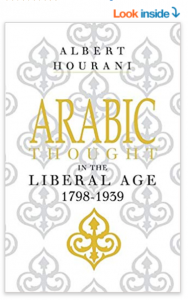Intellectuals Promoting Freedom and Democracy in Egypt
Freedom is the ultimate virtue of mankind [and] Democracy is the only political system of modern man and modern society. […] Therefore, Egypt must be committed to freedom and democracy.
Egypt wouldn’t have been my first guess either. Israel Gershoni quotes the above from ‘Abbas Mahmud al-‘Aqqad 1940 book attacking Hitler’s policies. he further explains:
When ‘Aqqad (1889–1964) expressed these views in the early years of the Second World War, his liberal democratic worldview had fully coalesced. Already in his early fifties, he was an established and well-known intellectual active for more than three decades. In hundreds of articles published in the Egyptian press, and particularly in his book The Absolute Rule of the 20th Century (al-Hukm al-Mutlaq fi al-Qarn al-‘Ishrin), published in 1929, ‘Aqqad reaffirmed his commitment to democracy and his rejection of any form of absolutism, oligarchy, aristocracy, and autocratic monarchial rule, and in particular Fascism, Nazism, and, in a different way, Communism. …
However, ‘Aqqad was by no means exceptional. His ideas and activities aptly reflected the mainstream current within the intellectual community. … This intellectual current coalesced and exerted its influence during the interwar era (1919–39) until the mid-1950s, galvanizing and institutionalizing a strong tradition of liberal democratic thought in Egypt and in the Arab Middle East. The intellectual community was active in a relatively sympathetic and friendly environment underpinned by two essential elements: the first was the very existence of parliamentarism; the second was the emergence and development of a strong civil society. (Source.)
Advocates of freedom, democracy and a strong civil society were less popular in the U.S., England, Germany, France, and Italy in the years between World War I and World War II. Instead, popular U.S. and European intellectuals advocated new policies with government and business “working together” to better plan national economies. Episode One “The Battle of Ideas” in the PBS series The Commanding Heights, recounts the events that led to these new enthusiasms for government planners to play a much larger role in building stronger national economy. These nationalist socialist ideas resisted by (classical) liberal scholars writing in Egyptian journals and newspapers.
This debate over who will control The Commanding Heights of the economy continues today. The PBS series is based on the 1998 book of the same name, long before the 9/11 and the dot.com crash of 2001 and later bigger Great Recession and economic turmoil of 2007-2008. (Which led critics to again claim that capitalism was failing, and governments needed new regulatory powers in order to play even larger roles in economic planning.)
A key to understanding the half-century of turmoil, stagnation, and conflict in Egypt, Libya, Syria, Iraq, and other Middle East countries, is that European and Soviet inspired autocrats (Abdel Nasser, Saddam Hussein, Hafez al-Assad) took power across the Arab world, and pushed centralized “modernization” plans while suppressing advocates for freedom, democracy, and strong civil society institutions.
Students can read more (and Look Inside) of liberal or classical liberal ideas discussed across the Arab world in Albert Hourant’s Arabic Thought in the Liberal Age, 1798-1939 (Amazon link). 
Israel Gershoni further explains the transmission of classical liberal ideas in Egypt in the interwar years. He argues that a flourishing “civil society gave birth to a liberal public sphere, one that I define as the ‘effendi liberal public sphere.'”:
First, the effendiyya promoted and maintained freedom of the press, which facilitated the production of a diverse variety of hundreds of dailies, weeklies, and monthlies, and other print media products. Second, this explosion of print culture encouraged and expanded public discourses both in Egypt and throughout the Arab world. Third, the effendiyya was also responsible for the pluralistic culture of everyday life that flourished in coffee and teahouses, civil associations, entrepreneurial projects, political organizations, social clubs, cultural salons, and the theater and cinema industries. Old and young, men and women, Christians, Jews and Muslims, and elite and non-elite strata participated in this inclusive civil activity within public spheres. However, the intellectuals constituted the hardcore center of this effendi liberal public sphere: they were the idea makers, the cultural producers, the writers and artists.
This is an optimist look of the climate of ideas among many across the Arab world less than a century ago. Knowing that these discussions and debates existed and that they were “home-grown” is important. These aren’t European or American scholars pushing “western” ideas on Egypt and other countries, but rather local scholars and intellectuals discussing, writing, developing, and debating how the universal ideas of liberty and democracy could best bring peace and prosperity to Middle Eastern societies.
[ February 5, 2018: some broken links repaired.]
